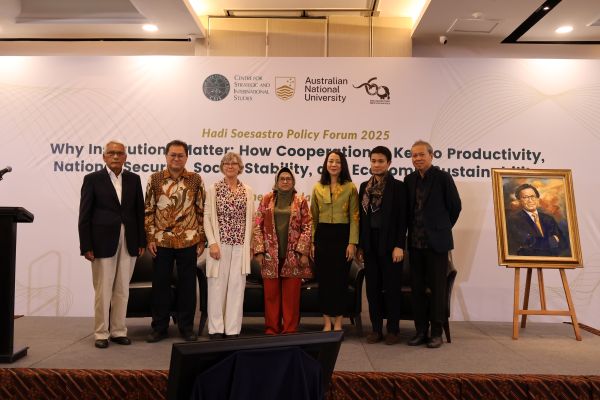
Jakarta, 13 August 2025 – Centre for Strategic and International Strategic (CSIS) Indonesia, along with the Australian National University have successfully hosted the Hadi Soesastro Policy Forum 2025 at CSIS Auditorium, Jakarta, on 13 August 2025. Held in the celebration of the Indonesia Project’s 60th Anniversary, this event featured a lecture from Jenny Gordon, highlighting the need to have strong institutions and cooperation which are essential to drive productivity, ensure national security, maintain social stability, and achieve economic sustainability.
In opening remarks, Yose Rizal Damuri, Executive Director CSIS Indonesia, highlighted that this year's lecture focuses on institutions which resonate to current global and national challenges that have recalibrated institutional roles and disrupted many aspects of life. He noted that the theme represents Hadi Soesastro’s deep interest in institutional development, terming this as “Institutional Involution” in the aftermath of the Asian Financial Crisis where institutions lost independence and served narrow interests. Budy P. Resosudarmo, the head of the ANU Indonesia Project, opened by expressing appreciation to leaders of CSIS and the family of Hadi Soesastro. He highlighted Hadi Soesastro’s lasting influence on Indonesia's policy development and noted the project's commitment to research, PhD programs, and knowledge dissemination to encourage public discourse on national development. This year’s HSPF features a lecture, the launch of a book on President Jokowi’s decade in office, and, on 14 August 2025, the launch of a book honoring Peter McCawley.
Key highlights:
Jenny Gordon, Lowy Institute & The Australian National University, started the session by highlighting the vital role of strong, adaptive institutions in fostering productivity, security, and sustainability. She emphasized that institutions enable cooperation, enforce rules, and rely on trust for productivity, stability, and governance. Cooperative reform, she added, increases the likelihood of achieving the best-case scenario for global stability and prosperity.
Djisman Simandjuntak, Chair of Board of Directors, CSIS Foundation, emphasized the urgent need for cooperation and the restoration of international institutions. He highlighted the U.S. distancing itself from established institutions, questioned whether any institution can guide technology change to be more equality-friendly, and proposed expanding the Indonesia Project into a broader Indonesia-Australia and East Asia cooperation initiative, including an elevated RCEP+.
Titik Anas, Padjajaran University, highlighted Indonesia’s progress over the past 20 years yet noting the remaining institutional gaps. She explained that weak institutions reduce trust and the access to the formal market which lead to affect productivity. She emphasized the importance of global institutions, cautioning that populist policies, such as those under Trump, have eroded trust in multilateral systems. Anas advocated for open regionalism and maximizing existing cooperation to sustain growth and development.
#CSISIndonesia
#NalarAjarTerusanBudi




